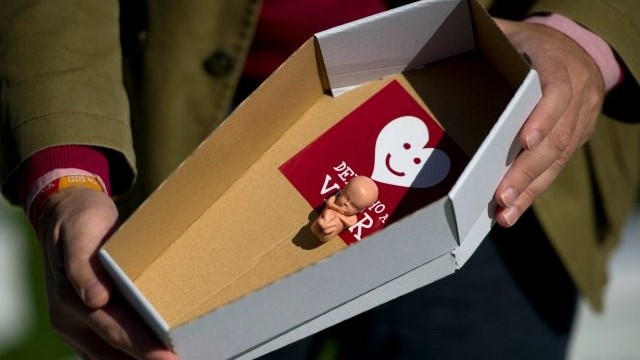A federal appeals court restored an Indiana law on Monday requiring medical providers to bury or cremate the remains of aborted babies.
Judge Frank Easterbrook in the U.S. Court of Appeals for the Seventh Circuit reversed a lower court decision claiming the 2016 law violates the First Amendment of people who do not believe unborn babies deserve the same rights has born people.
“Instead of remanding with instructions to tailor the relief to the violation, we reverse outright — because there is no violation. Statutes that require people to disobey sincerely held religious beliefs can pose difficult analytical challenges,” Easterbrook wrote in his opinion. “But Indiana does not require any woman who has obtained an abortion to violate any belief, religious or secular. The cremate-or-bury directive applies only to hospitals and clinics.”
Easterbrook also wrote that before the enactment of the statutes, “it had been common for medical providers to place fetal remains in the garbage (“medical waste”), but noted that the Supreme Court already concluded that states are “entitled to end that practice.”
“The district court’s needlessly broad injunction treats the statute as invalid across the board (that is, on its face rather than as applied), which effectively countermands the Supreme Court’s decision for the entire population of Indiana. This offends the principle that relief should be no greater than necessary to protect the rights of the prevailing litigants,” he wrote.
Easterbrook further reasoned that plaintiffs argument that cremation or burial implies “the personhood of an unborn fetus” because “only human beings are cremated or buried” is “questionable.”

An anti-abortion activist holds a model of a fetus during a protest outside of the Longworth House Office Building on Capitol Hill in Washington, DC. (MANDEL NGAN/AFP via Getty Images)
“Dogs, cats, and other pets may be cremated or buried, sometimes as a result of legal requirements not to put animals’ bodies in the garbage. Indiana’s statute about fetal remains therefore need not imply anything about the appropriate characterization of a fetus,” he wrote. “At all events, a moral objection to one potential implication of the way medical providers handle fetal remains is some distance from a contention that the state compels any woman to violate her own religious tenets.”

Anti-abortion demonstrators rally outside the U.S. Supreme Court on November 01, 2021 in Washington, DC. (Drew Angerer/Getty Images
“If the statute reflects anyone’s view about fetal personhood, it is the view of the State of Indiana. Yet units of government are entitled to have, express, and act on, their own views about contestable subjects,” he continued.
The lawsuit was originally brought by the Women’s Med Group abortion clinic in Indianapolis, its owner, two nurse practitioners who work at the clinic and three women in 2020. Their lawsuit reportedly “argued Indiana’s requirements caused both abortion and miscarriage patients ‘shame, stigma, anguish, and anger’ because they ‘send the unmistakable message that someone who has had an abortion or miscarriage is responsible for the death of a person,’” the Associated Press reported.
Rupali Sharma, who is an attorney for the plaintiffs, told the publication, “We are currently exploring all options with plaintiffs to ensure abortion patients can get the care they need with the dignity they deserve.”
Indiana Attorney General Todd Rokita called the court’s decision a “win for basic decency.”
“The bodies of unborn babies are more than mere medical waste to be tossed out with trash,” Rokita said in a statement. “They are human beings who deserve the dignity of cremation or burial. The appellate court’s decision is a win for basic decency.”
Indiana notably became the first state since the Supreme Court overturned Roe v. Wade to pass a near-total ban on abortion. However, abortions in the state have been allowed to continue after a judge sided with abortion clinic operators who say the law violates the state constitution, the report stated. The state Supreme Court will hear arguments in the lawsuit in January.
The case is Doe v. Rokita, No. 22-2748 in the U.S. Court of Appeals for the Seventh Circuit.


